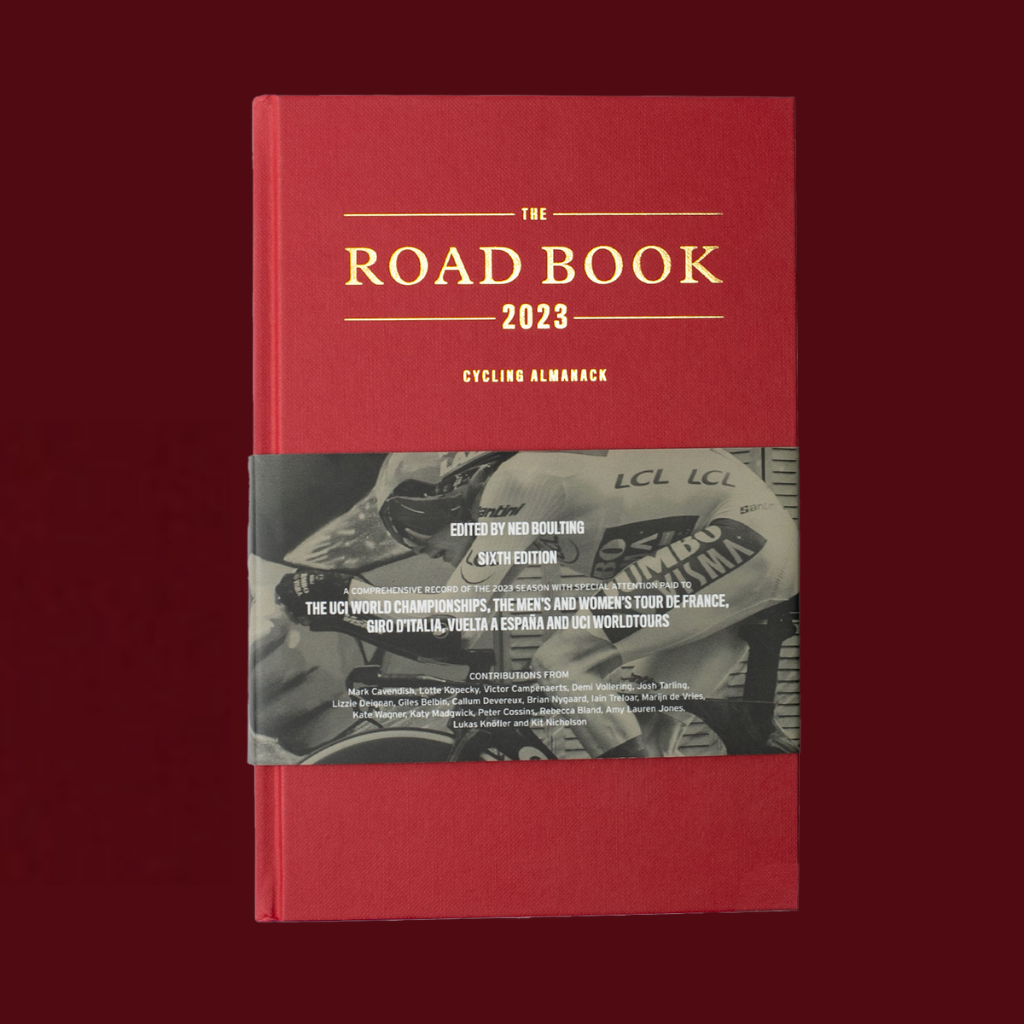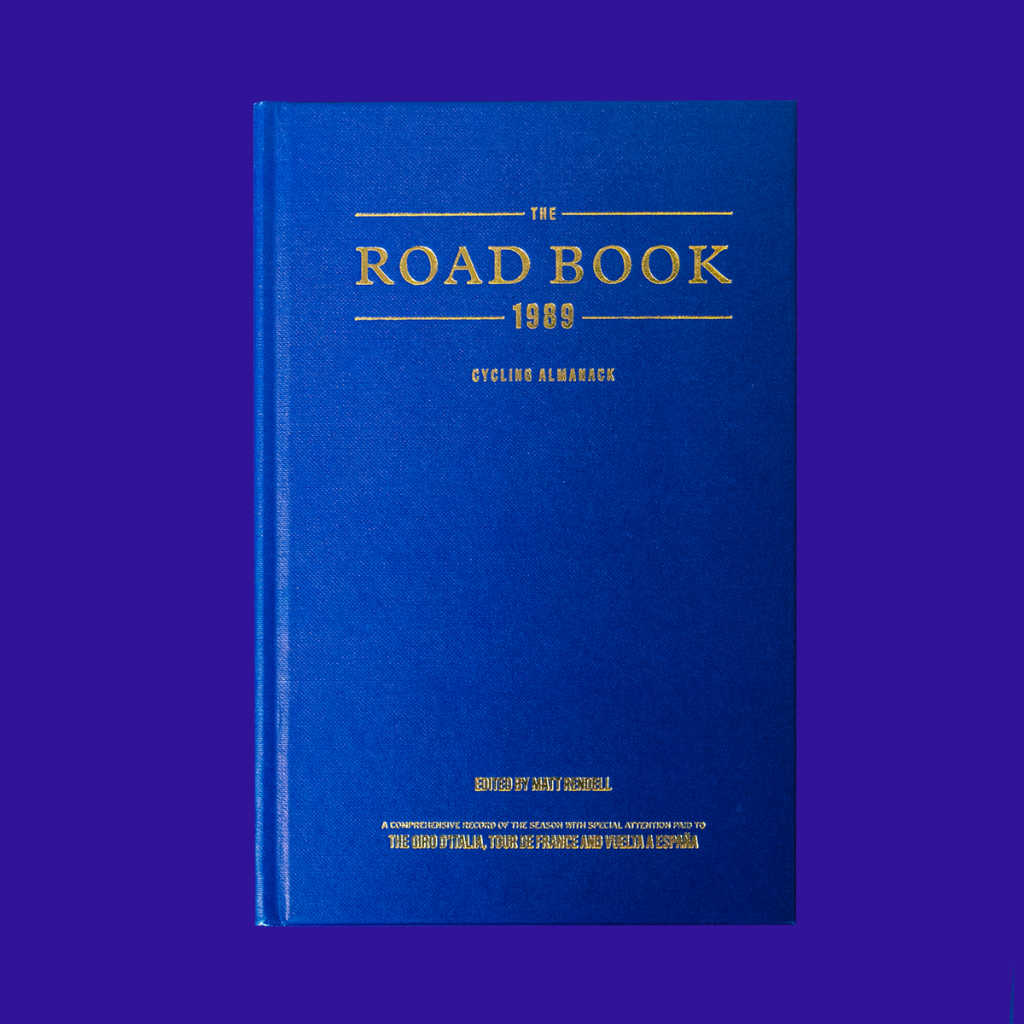Road BOOK RETROSPECTIVE

To celebrate International Women’s Day (and as we are in the grip of the Classics), we’ve released, in full, Lizzie Deignan’s account of her monumental victory at the first ever women’s edition of Paris-Roubaix in 2021, from The Road Book 2021. This essay was one of our editor, Ned Boulting’s favourite ‘Classics’ themed pieces and as such has been selected to join the Road Book Retrospective series.
The first-ever edition of the women’s Paris–Roubaix had been anticipated with growing excitement by the cycling public, who were aware they would be witnessing a historic event. What comes as something of a surprise is that the emphatic winner of the race, Lizzie Deignan, was equally aware of the wider context of her achievement as she crossed the line and raised one bloodied hand skywards in a timeless victory salute.
——
I started cycling when I was 15, and I didn’t grow up in a cycling family. I grew up watching the London marathon and that kind of thing. That was the sort of sporting event we would watch. But when I moved to Belgium and tried to become a professional on the road, that’s when I became aware of the iconic races. Obviously Flanders is huge, but the special thing about Roubaix was that we didn’t have a women’s one. So I was always available to watch it! I wasn’t racing and always had a day off, so that meant it was a day on the sofa watching the race. It’s one of those races that you watch from start to finish – and there’s not that many that you do. You might watch a Tour de France stage and have a power nap in the middle. But, in Roubaix, you don’t.
I think it’s just a culmination of everything that a cyclist needs: they need to be skilful, they need to be strong, they need to have mental toughness and tactical awareness. That’s why I love it: because it’s more than just being the strongest bike rider. There are winners who puncture or crash, but you need it to go more right for you than anyone else, I suppose. It’s just never over until it’s over.
I was delighted and surprised when ASO announced in 2020 that they were going to hold a women’s Paris–Roubaix. The news arrived in the middle of a pandemic. It was a huge motivator because we just didn’t know what was going to happen: how the pandemic might affect women’s cycling, and whether all the progress that had been made would be damaged by the financial insecurity of sponsors.
I had such an anti-climactic feeling after the Olympic Games because I’d put myself in the best possible physical shape and yet I couldn’t control the race. And I knew going into the World Championships that actually my focus and my objective was Paris–Roubaix. In Trek-Segafredo, I knew we had a chance to win it, and I didn’t know how strong a GB Team would be at the Worlds. They really surprised me and rode phenomenally but, in terms of being able to dictate the way a race can go, I didn’t want to leave myself feeling like I had done after the Olympics again.
When I got to Roubaix our DS, Ina Teutenberg, told me I wasn’t going to be a leader, and I had to accept that. Ellen van Dijk had just won the world time trial championship, and Elisa Longo Borghini had been on such exceptional form. It was an ongoing conversation. We went to Roubaix on the Wednesday to do some recons, and it was quite clear from the language and the focus around the team that we were going to be riding for Ellen. So it didn’t come as a surprise in the team meeting two days later to find out that I wasn’t the leader.
We’d done a recon in the spring and I had been pleasantly surprised. I’d imagined the worst possible cobbles – and they are pretty ruthless – but I think having the specialist equipment just makes a massive difference. It’s a huge advantage. I mean, you can’t deny it: the technology has moved on from those iconic images of Roubaix that we all remember. It is different now. But it was still definitely different to anything we had ever done before, and I had some anxiety before the race – not knowing what we were getting into, I suppose.
In the team meeting, we were told to be ‘OK with chaos’. That was what Ina said: ‘You have to be OK in the chaos.’ I think as a rider I’m pretty good in chaotic situations. I’m pretty level-headed. That probably helped in the race.
On the morning of the race, I felt excited. Genuine excitement. The weather forecast presented me with an opportunity. It’s not something that I actually wanted – because obviously it leads to a more dangerous race, and no one wants that – but I wasn’t scared by the possibility of rain. In the first 30km you could really feel the pressure. We were riding like we were setting up a bunch sprint. It was seriously hectic. You could feel the nervous energy in the peloton and some people don’t cope well with that, obviously.
Our roles in the race were clearly defined. Our leaders were Elisa and Ellen. Audrey Cordon-Ragot and I were the last helpers. But there was a moment with about 5km to go until the first cobbled sector, when I turned to Audrey and said, ‘Do I go back for them?’ Elisa and Ellen just couldn’t work their way through the bunch and were towards the back. It was all over the place, crashes were happening even on the tarmac. They were struggling to hold a position. Audrey made the perfect call and said that I should stay at the front. There was no good in us all being at the back. I at least needed to be an insurance tactic.
There was a moment when it all bottle-necked into the cobbles. I saw a gap opening up on the left-hand side and I did a full-on sprint and went into the sector in first place. I carried such a momentum that I created a gap. Lauretta Hanson was on my wheel and she made another really good call to just let me go.
At that point I know there were people looking at each other in the peloton and saying, ‘She’s crazy.’ And of course, it was crazy. But I knew that, as long as I was off the front, I was buying Ellen and Elisa time to reorganise themselves in the peloton and then come across to me. On the radio Ina said, ‘OK, Lizzie, you’ve got a gap. Just ride at 75 per cent. Get organised behind, girls.’ But the gap kept just stretching out because the cobbles were so wet and slippery. Once the gap had gone out to a minute and a half, that’s when Ina came on the radio and said, ‘Lizzie, you’ve got to start riding at 100 per cent.’ And that’s what I did. I think I still had about 50km to go. I still felt like I was just the insurance policy because behind we still had Ellen, Audrey and Elisa. That was the idea, the whole time, until… I don’t know. There were probably about 20km to go when Ina started saying to me, ‘Lizzie, you’ve got this.’ I thought I was hearing the radio wrong. I mean, what was she talking about?!
I was aware the whole time that I was one wrong move away from it all being over. But… I don’t know. You have these days as a rider when you’re just on it. I just felt in control, even when I was slipping. I didn’t panic at any point. I also knew that I was going over these points as a solo rider and I could only imagine what was going on behind. I was definitely glad to be alone.
Then I got the information that Marianne Vos was coming across. When you hear that she is trying to ride you down, you feel as if you’re being hunted. Elisa tried to stay on her wheel but couldn’t. I didn’t know that Ellen had crashed. So I knew at that point that I had to safely get over the cobbles with enough of a gap. I knew that she’d take time on me over the cobbles because she had fresh legs and she’s technically such a very good rider. But, as long as I still had a minute, then I was confident. She took a big chunk of time out of me during her initial attack, but then I just held her. I felt incredibly proud to be standing on the podium next to her. We have a huge amount of respect for each other. Her palmarès is beyond anything I could dream of, but I’ve given her some good battles in my time.
I only felt I was going to win the race when I entered the velodrome. Watching the men’s race the following day, I just thought, ‘Thank god I was on my own!’ To have to judge a sprint on the track when you’ve just had that many cobbles rattling your bones for that long! You’re no longer able to make good decisions.
I never wear gloves to race. Not even in winter. I like to be able to feel the handlebars in my hands. I was the same on the track. I hadn’t worn them on recon and I hadn’t got blisters, so I didn’t want to change. But obviously I paid for that decision. In the race I didn’t feel my hands at all. The photos of the blood on my handlebar tape have gone everywhere and I suppose it makes the story even better.
I genuinely felt like the moment was bigger than me. I really felt like I was part of history. I said afterwards that I had felt the power of generations of women. I had Ina Teutenberg in the car behind me. She was a huge champion to me when I was growing up, watching her then racing alongside her. She won hundreds of races. Just to know that someone like her – who would absolutely have adored to race that race but never got the opportunity – was in our car made me so grateful even to be there. I am proud of the women before me who have raced just on passion. That race is all about passion.
As for the Roubaix showers, well, I have non-cycling friends who wonder what on earth that’s all about! They can’t believe there’s a picture of me in the showers being auctioned for charity. But it is an iconic image – you’re washing off the mud of the battle.
If you enjoyed Lizzie’s essay, why not pick up your very own copy of The Road Book 2021 from our online shop: BUY “THE ROAD BOOK” HERE
Use the coupon code: RETROCLASSICS for a 10% discount.







